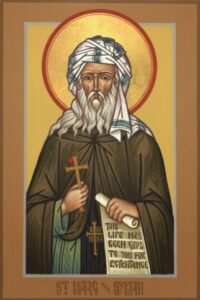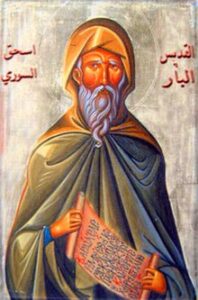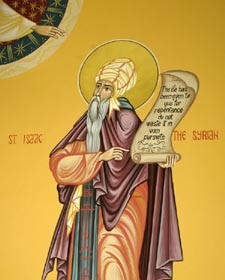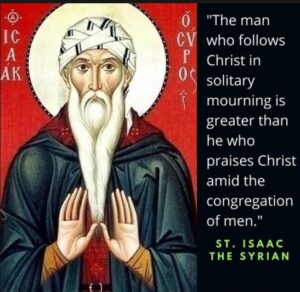Mar Isaac of Nineveh – May 13/Jan 28 I Abba Isaac, Anchorite, Bishop, Theologian Monk

St Isaac of Nineveh, also known as Isaac the Syrian (Ishaq an-Naynuwī), is a 7th century saint known for his strict asceticism and ascetic writings. St Isaac was an anchorite, bishop, theologian monk, born in AD 613, is also remembered as Abba Isaac, Isaac Syrus and Isaac of Qatar. His place of birth is ambiguous, though some sources attribute his place to Beth Katraye, Eastern Arabia, in the present-day Bahrain and Qatar region, other sources mention Kurdistan, in the jurisdiction of the Syrian Church of Persia, thus he was a Syrian, by birth.
It was quite usual for boys to enter monasteries in their young age, where they used to get educated and even prepare for a life as priests and monks. Isaac, while still quite young, with his brother entered the great monastery of St. Matthew at Nineveh, where he received his monastic tonsure too. His fame grew as a holy man and teacher. Here having advanced far in obedience and the practice of prayer. His virtues, learning and ascetic life caught the attention of the fellow brethren monks and proposed him as the abbot of the monastery. St Isaac did not want this burden, but preferred a life of silence and solitude, so he left the monastery to live alone in the desert. His brother and other monks urged him, more than once to return to the monastery, but he did not agree.

However, when the fame of his holy life had spread and his reputation of an ardent monk reached the city of Nineveh, the people prevailed on the then Catholicos George, was consecrated as the the Bishop of Nineveh, the former capital of Assyria to the north, in around AD 676. Reluctantly but obediently, he accepted, because he knew that his spiritual calling and strength came through a life of solitude and prayer. But seeing, the crude manners and disobedience of the inhabitants of the city, the saint felt that it was beyond his ability to guide them, and moreover, he yearned for solitude. After about five months as bishop, feeling that functions of the bishop interfered with the ascetic life, St. Isaac resigned his office and retired to the desert south to the wilderness of Mount Matout, a refuge for anchorites of Scete, where other anchorites (living apart form society focusing on prayer in their lives) who shared his spiritual outlook lived.
The historical facts about St. Isaac is few and little. He is known, mainly through his writings and loved by many generations of Christians. He was a religious solitary, writing for religious hermits. His homilies and writing were intended and purposive for hermits living in severe stillness, constant silence and strict seclusion, however he writes as an affectionate and loving father for his spiritual children. His writings are made much memorable by his knowledge of the human heart, and his striking language about God’s invincible mercy, His infinite love and Mercy, about how Providence works out our salvation through adversities, about the practice of prayer and fasting, in flight from the world in the battle against the passions. St Isaac sought to find and teach the way to God through a Christian life in which worship, the sacraments and prayer, transforming and uplifting the whole person: body, heart and soul. , He was full of wisdom and common sense, based on the importance of watching the small steps which make up our journey.

The purity of his own Orthodox faith, clearly evident and lucidly shown, in his writings that the Church has nonetheless recognized his sanctity. His treatises on the behavior of excellence is abundantly quoted by the old Syrian writers. He composed volumes on spiritual guidance, God’s providence, prayer life, obedience to God, love towards neighbors, judging others, solitude and government. He wrote much on the Holy Spirit. His style teems with metaphor; his matter is often interesting, both theologically and historically. He treats mainly the ascetic life, its rules and spiritual experiences. Watching, fasting, silence, and solitude are means to self-mastery. There he lived in solitude for many years studying the Scriptures, but eventually blindness and old age forced him to retire to the monastery of Rabban Shabur, Beth Huzaye – the modern Khuzistan in southwestern Iran, where he dictated his thoughts of his Ascetical Homilies and other jewel-like works on the spiritual life.
St Isaac advises us to stand, to raise both arms to heaven, or to even lie prostrate on the ground, so as to prepare the body for prayer.
It is not that God needs us to take humble and beseeching positions: rather, it is we who benefit from them.

Towards the end of his life, drawing on his long experience, St. Isaac composed homilies in his native Syriac as a testament to what he had come to know, as few do, about the infinite love and mercy of God, about how Providence works out our salvation through adversities and suffering, about the practice of prayer and fasting and flight from the world in the battle against the passions. He finally reposed and was buried around AD 700. His feast day is January 28 and May 13.
One incident is recorded in the life of Isaac of Nineveh, was, once two Christians came to him asking to settle a dispute. One man acknowledged that he owed money to the other, but asked for a short extension. The lender threatened to bring his debtor to court to force him to pay. St. Isaac, citing the Gospel, asked him to be merciful and give the debtor more time to pay. The man said, “Leave your Gospel out of this!” St. Isaac replied, “If you will not submit to the Lord’s commandments in the Gospel, then what remains for me to do here?”
Quotations
“Be persecuted, rather than be a persecutor. Be crucified, rather than be a crucifier. Be treated unjustly, rather than treat anyone unjustly. Be oppressed, rather than zealous. Lay hold of goodness, rather than justice.” ~ St Isaac of Nineveh
“A small but always persistent discipline is a great force; for a soft drop falling persistently, hollows out hard rock.” ~ St Isaac of Nineveh
“The Lord’s Day is a mystery of the knowledge of the truth that is not received by flesh and blood, and it transcends speculations. In this age there is no eighth day, nor is there a true Sabbath. For he who said that `God rested on the seventh day,’ signified the rest [of our nature] from the course of this life, since the grave is also of a bodily nature and belongs to this world. Six days are accomplished in the husbandry of life by means of keeping the commandments; the seventh is spent entirely in the grave; and the eighth is the departure from it.” — The Ascetical Homilies, ~ St Isaac of Nineveh
“Why do you trouble yourself in a house that is not your own? Let the sight of a dead man be a teacher for you concerning your departure from hence.” ~ St Isaac of Nineveh
“The knowledge of the Cross is concealed in the sufferings of the Cross.” -~ St Isaac of Nineveh
“The man who follows Christ in solitary mourning is greater than he who praises Christ amid the congregation of men.” ~ St Isaac of Nineveh
“Why do you increase your bonds? Take hold of your life before your light grows dark and you seek help and do not find it. This life has been given to you for repentance; do not waste it in vain pursuits.” ~ St Isaac of Nineveh
He who is master of possessions, is the slave of passions. Do not estimate gold and silver only as possessions, but all things thou possess for the sake of the desire of thy will. ~ St Isaac of Nineveh

0 Comments